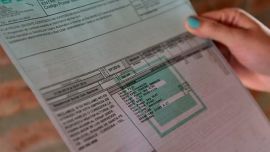British authorities have new information about the mysterious substance that left a former Russian spy and his daughter in critical condition, a government minister said Wednesday.
Home Secretary Amber Rudd said officials would make a statement later in the day about what sickened Sergei Skripal, 66, and his 33-year-old daughter, Yulia, who were found slumped on a bench in the center of the southern city of Salisbury on Sunday. Rudd on Wednesday chaired a meeting of the government's emergency committee, known as Cobra, to consider the investigation, which is now in the hands of counterterrorism police.
"We do know more about the substance and the police will be making a further statement this afternoon in order to share some of that," she said. She added that it is important to respond not to rumour but to evidence.
Her comments came as Moscow said the case was being used to fuel an "anti-Russian campaign" and further strain ties with Britain.
"What happened to Skripal has been immediately used to further incite an anti-Russian campaign in Western media," Russian Foreign Ministry spokeswoman Maria Zakharova said.
Double agent
Skripal, a former colonel in Russia's GRU military intelligence service, was convicted in 2006 of spying for Britain and imprisoned. He was freed in 2010 as part of a widely publicised spy swap in which the US agreed to hand over 10 members of a Russian sleeper cell found operating in the US, in return for four Russians convicted of spying for the West.
He and his daughter were found collapsed on a bench near a shopping mall Sunday in the town of Salisbury, 90 miles (145 kilometres) southwest of London. Police believe they were exposed to an unknown substance, and a British military research facility is thought to be conducting tests to determine what it is.
Foreign Secretary Boris Johnson told lawmakers Tuesday that if Moscow is shown to have been involved in the Skripal case, the government would act — possibly downgrading England's participation in this year's soccer World Cup in Russia. Johnson warned British officials may not be involved in the sporting event "in the normal way," but did not elaborate.
While police say they are keeping an open mind about the case, it has reminded Britain of the 2006 poisoning of former Russian spy and Kremlin critic Alexander Litvinenko.
Johnson himself noted the "echoes" with the Litvinenko case, which Britain has blamed on Moscow. Zakharova said Johnson's comments were "wild."
A British inquiry into Litvinenko's death found that Russian agents poisoned him by lacing his tea with radioactive polonium-210 and that the killing was probably approved by President Vladimir Putin. Russia has denied any involvement in Litvinenko's death, and this week said it wasn't involved in Skripal's collapse.
Litvinenko's widow, Marina, wrote Wednesday in the UK newspaper, The Times, that her husband's case made clear to Britain's emergency services that they need to act quickly when "someone suddenly falls mysteriously ill."
"I am happy my story has raised awareness about the potential danger posed by Moscow, and this could help to save somebody's life," she wrote in an opinion piece.
Counterterrorism specialists
British counterterrorism specialists have taken control of Skripal's case from local police trying to unravel the mystery of what happened. The matter has not been declared a terrorist incident.
Authorities have cordoned off a new scene in the case, securing Solstice Park, a business park in Amesbury near Stonehenge, the prehistoric monument and world heritage site. Amesbury is about nine miles from Salisbury.
Police also asked members of the public to come forward if they had visited Salisbury's town centre, a pizza restaurant or a pub where the pair were last seen on Sunday.
As speculation swirled, experts watching the matter say the circumstances so far suggest that it is unlikely that a radioactive substance was responsible, as was the case with Litvinenko.
Malcolm Sperrin, the former head of medical physics at the Royal Berkshire Hospital, said it would normally take time for a radioactive dose to become evident. Skripal and his daughter were seen on CCTV walking in the city only a short time before they became ill.
"If you were to give a dose of something radioactive, that could take many weeks" to become clear, he said — unless it were highly radioactive. In that case, those who came into contact with you would also be affected.
Most of the people who initially responded to the attack have been released from the hospital. Beyond that, there are too many unknowns to identify the chemical from arm's length, he said.
"There are a lot of very exotic chemicals," he said.
Some emergency services personnel who treated the pair required medical treatment, and The Sun tabloid reported that two police officers had itchy eyes, wheezing and rashes.
The BBC reported that without knowing the cause, the hospital treating Skripal and his daughter could only treat their symptoms, citing one source as saying that he "is not in a good way at all."
- TIMES/AFP/AP

























Comments